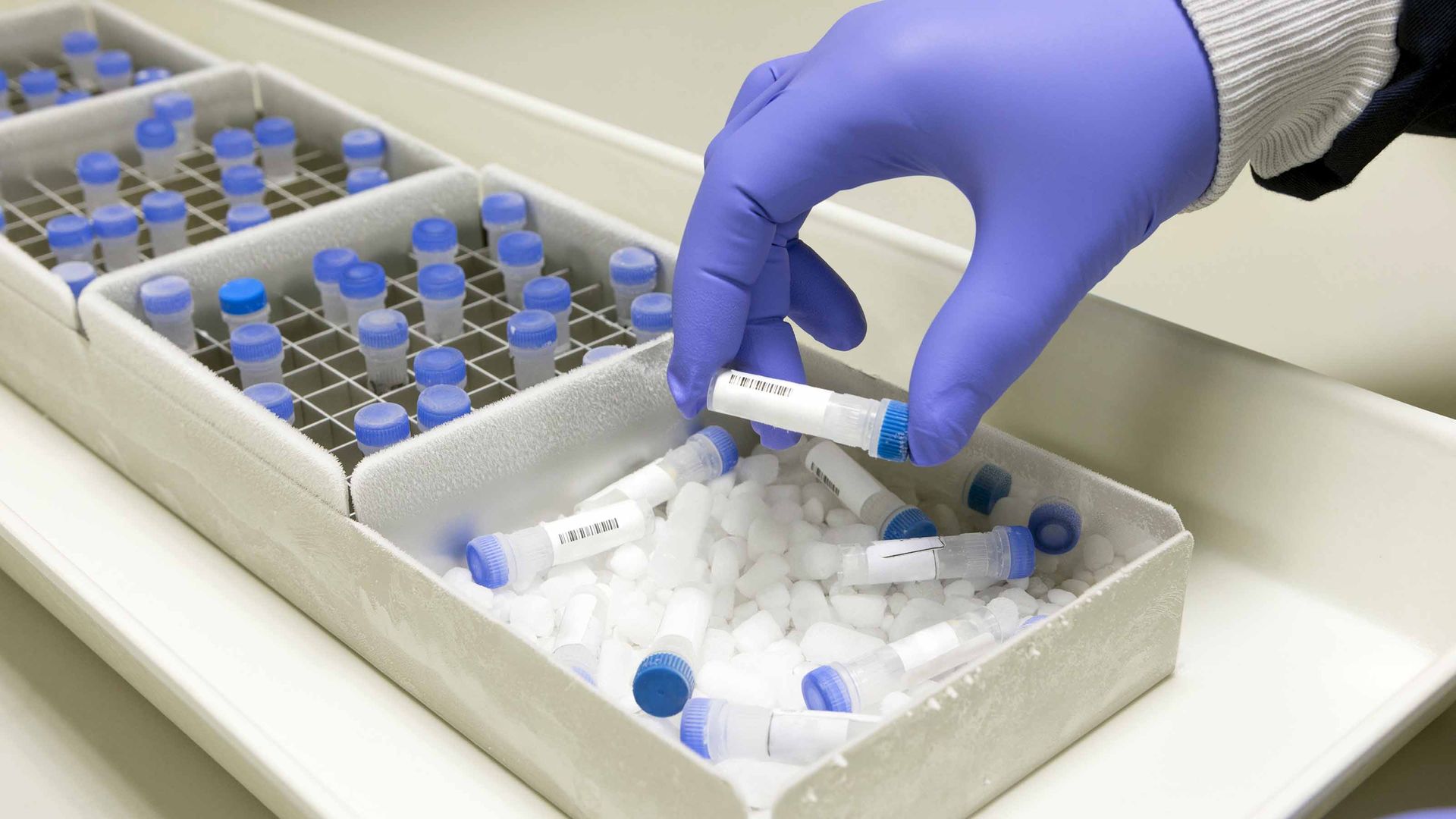9 Best Biotech ETFs to Play High-Octane Trends
Biotechnology is a dynamic but often volatile industry. These biotech ETFs provide a lower-risk way to invest in the space.
- (opens in new tab)
- (opens in new tab)
- (opens in new tab)
- Newsletter sign up Newsletter


Biotechnology might not be at the top of every investor's mind, but biotech exchange-traded funds (ETFs) should always at least be on your radar.
Healthcare is one of the market's most dynamic and resilient sectors. After all, one of the surest things in life is getting sick and needing care as we age – and that means guaranteed "customers" in any environment.
The opportunities are particularly large for biotechnology stocks addressing big medical challenges such as cancer or Alzheimer's or rare conditions without any existing treatments available. But some investors might be better off interacting with the industry through biotech ETFs instead.
That's because individual biotech stocks can be incredibly volatile. Small, trial-stage firms sometimes burn cash for years on the hopes of their research paying off. When it does, these biotechnology start-ups soar – but when it doesn't, they tend to drop like rocks.
Biotech ETFs provide a lower-risk way to play this broader trend. Interested investors don't have to personally research how individual stocks are performing or look up rather arcane studies on unpronounceable diseases. That's because these diverse funds hold dozens or hundreds of stocks, preventing any one company from having an disastrously outsized impact on your portfolio.
Here are nine of the best biotech ETFs to play this high-octane healthcare trend. Each provides a unique way to approach this corner of the market.
Data is as of July 7. Dividend yields are calculated by annualizing the most recent payout and dividing by the share price.

iShares Biotechnology ETF
- Assets under management: $10.6 billion
- Dividend yield: 0.17%
- Expenses: 0.46%, or $46 annually for every $10,000 invested
The iShares Biotechnology ETF (IBB (opens in new tab), $161.43) is the leader among biotech ETFs, with about $10 billion in assets under management. That makes it a very popular and liquid way to trade biotech stocks in an exchange-traded fund. Top holdings among its 270-some positions at present include Amgen (AMGN (opens in new tab)), Gilead Sciences (GILD (opens in new tab)) and Moderna (MRNA (opens in new tab)).
But it's worth noting that these are hardly start-ups anymore, with the "smallest" of the three (Gilead) boasting a market capitalization of $85 billion – larger than companies like General Motors (GM (opens in new tab)) or Ford (F (opens in new tab)). Furthermore, these mature companies represent the lion's share of the fund with that aforementioned trio worth about 20% of the total assets alone.
That may not be a drawback if you want to generally play the next generation of drugmakers, but also want to make sure you're not throwing money behind unproven start-ups that may not have much revenue or consistent profitability to speak of.
But it's worth noting nevertheless that many of the top holdings have already seen considerable growth. In other words, they may not provide the "hockey stick" in their charts that some investors associate with breakout biotech investing.
To learn more about IBB, visit the iShares provider site. (opens in new tab)

ARK Genomic Revolution ETF
- Assets under management: $9.4 billion
- Dividend yield: 0.00%
- Expenses: 0.75%
Close behind IBB in terms of largest biotech ETFs is the ARK Genomic Revolution ETF (ARKG (opens in new tab), $88.70). This is a more focused offering in some ways because it has only about 60 stocks, but it's a more disparate fund in other ways as it includes some outliers you may not immediately think of as biotech stocks.
For instance, the top position at present is Teladoc Health (TDOC (opens in new tab)), a $24 billion healthcare services stock that specializes in remote doctor visits and "virtual care." Another top holding is Exact Sciences (EXAS (opens in new tab)), a $20 billion diagnostics and testing company.
While other more traditional biotechs like Regeneron Pharmaceuticals (REGN (opens in new tab)) are also high up on the list, admittedly a handful of components may make some biotech investors scratch their heads a bit if they expect to see only drugmakers here.
Some investors may appreciate this extra layer of diversification, but as with other funds on this list, it is important to clearly understand the way this biotech fund is structured before you invest your hard-earned cash.
To learn more about ARKG, visit the ARK Invest provider site. (opens in new tab)

SPDR S&P Biotech ETF
- Assets under management: $7.4 billion
- Dividend yield: 0.23%
- Expenses: 0.35%
The third major biotech ETF that's out there is the SPDR S&P Biotech ETF (XBI (opens in new tab), $131.35) – an "equal weight" offering from SPDR with more than $7 billion in assets at present.
It's more diversified than some of the other picks on this list of biotech funds in that it has about 200 total holdings, but regularly rebalances to try and spread the cash equally around each position.
That means while you do have a smattering of mature biotechs, you also get plenty of exposure to lesser-known picks with high potential – like Intellia Therapeutics (NTLA (opens in new tab)), which has surged more than 266% year-to-date.
That massive run has naturally caused the value of NTLA stock to represent a larger share of the portfolio than other stocks that haven't fared as well. But even so, Intellia accounts for just over 1% of the total assets at present – proving that XBI is serious about diversification.
To learn more about XBI, visit the SPDR provider site. (opens in new tab)

VanEck Vectors Biotech ETF
- Assets under management: $563.9 million
- Dividend yield: 0.3%
- Expenses: 0.35%
VanEck Vectors Biotech ETF (BBH (opens in new tab), $198.05) is slightly smaller than the biotech ETFs we've seen so far, but still quite established with more than $560 million in customer funds.
However, when it comes to the makeup of the portfolio itself, BBH is significantly smaller with just 25 total stocks right now – and about 20% in the top three positions, which, similar to IBB, are AMGN, GILD and MRNA.
This "all your eggs in one basket" approach is certainly higher risk, but it has also resulted in significantly higher rewards this year. Consider that the prior XBI fund is actually down slightly on the year, while BBH is up an impressive 16.7%.
As with so many other investments, it's worth remembering that past performance in this biotech ETF is not a guarantee of future returns. With a short list of stocks, there is more risk for things to go south if just one or two components roll over. But, as you can see from recent gains, when things go well, the investors in BBH can really cash in.
To learn more about BBH, visit the VanEck provider site. (opens in new tab)

iShares Genomics Immunology and Healthcare ETF
- Assets under management: $322.6 million
- Dividend yield: 0.2%
- Expenses: 0.47%
The iShares Genomics Immunology and Healthcare ETF (IDNA (opens in new tab), $49.66) follows a similar approach to BBH insofar as it's not as interested in casting a wide net on a few hundred biotech stocks. The list right now is about 50 total components in this roughly $320 million biotech fund.
However, BBH is largely focused on mature biotech companies that offer up many different types of treatments. What this iShares fund offers is right in the name – a more direct play on the unique category of drugs and technologies that serve genomics and immunotherapy applications.
Specifically, the fund's top holdings right now include gene therapy company CRISPR Therapeutics (CRSP (opens in new tab)) and testing company Invitae (NVTA (opens in new tab)) that offers screening for cancer, heart disease and other conditions based on your personal heredity.
If you are interested in this specific corner of biotech, IDNA offers a way to do so without picking individual stocks.
To learn more about IDNA, visit the iShares provider site. (opens in new tab)

Invesco Dynamic Biotechnology & Genome ETF
- Assets under management: $293.1 million
- Dividend yield: 0.00%
- Expenses: 0.58%
Taking a different approach, the Invesco Dynamic Biotechnology & Genome ETF (PBE (opens in new tab), $76.69) invests in a short list of roughly 30 companies, but picks and chooses biotech stocks based on qualitative criteria. Specifically, documents from Invesco state PBE is built "by thoroughly evaluating companies based on a variety of investment merit criteria, including price momentum, earnings momentum, quality, management action and value."
Right now, biotech stocks Biogen (BIIB (opens in new tab)) and Illumina (ILMN (opens in new tab)) have the highest weightings based on PBE's methodology.
Generally speaking, actively managed ETFs like this get a bad rap. Countless articles have been written about how low-cost index funds regularly outperform managers who claim their costly "special sauce" makes for a better approach to investing. However, PBE has a pretty good track record.
In the last 12 months, for instance, this Invesco fund has surged 28% – much better than two of the biggest biotech ETFs IBB and XBI, both of which are "only" up about 16% in the same period.
To learn more about PBE, visit the Invesco provider site. (opens in new tab)

ALPS Medical Breakthroughs ETF
- Assets under management: $232.7 million
- Dividend yield: 0.00%
- Expenses: 0.50%
ALPS Medical Breakthroughs ETF (SBIO (opens in new tab), $48.17) is a smaller exchange-traded fund when it comes to both the brand name of the asset manager and the total funds under management. But SBIO is actually one of the more interesting options on this list of biotech ETFs because of its wide reach, as well as its focus on lesser-known names in the industry.
Currently, the fund has about 130 total positions, topping many of the other biotech ETFs featured here when it comes to breadth. Furthermore, its top three holdings at the moment – Vir Biotechnology (VIR (opens in new tab)), Legend Biotech (LEGN (opens in new tab)) and TG Therapeutics (TGTX (opens in new tab)) – collectively tally only about $16 billion or so in market value.
Considering the $50 billion or even $100 billion healthcare giants that populate many of the other biotech funds on this list, SBIO's focus on small companies – even while holding a deep bench of prospects – could appeal to investors looking at truly dynamic biotech companies.
To learn more about SBIO, visit the ALPS Advisors provider site. (opens in new tab)

Principal Healthcare Innovators Index ETF
- Assets under management: $170.3 million
- Dividend yield: 0.00%
- Expenses: 0.42%
With just under $200 million in assets, the Principal Healthcare Innovators Index ETF (BTEC (opens in new tab), $58.67) is significantly smaller than other biotech ETFs on this list. However, it is the leader in total holdings with more than 300 total positions at present and thus could be worth a look because of this.
Keep in mind, however, that BTEC's broad approach means that it is actually slightly more inclusive than simply investing in the biotech sector. So you get top holdings like Seagen (SGEN (opens in new tab)), a smaller biotech focused on cancer cures, along with companies like Insulet (PODD (opens in new tab)), which makes wearable and implantable medical devices for diabetics to help manage their insulin.
Of course, if the reason you find biotechnology so appealing as an investment area is because you are fundamentally interested in next-gen medical companies, then it might not matter too much whether you're chasing just biotech drugmakers or also including medical device and technology services companies.
Still, that slightly more inclusive approach is worth understanding before you decide where to put your cash.
To learn more about BTEC, visit the Principal provider site. (opens in new tab)

Loncar Cancer Immunotherapy ETF
- Assets under management: $46.5 million
- Dividend yield: 0.90%
- Expenses: 0.79%
Disclaimers up front: Loncar Cancer Immunotherapy ETF (CNCR (opens in new tab), $30.97) is the smallest fund on the list with only about $50 million in total assets under management. It is also the most expensive as measured by annual fees.
However, it is undeniably appealing to investors who are interested in biotech stocks for one simple reason – the potential for blockbuster cancer drugs to power their portfolio.If you happen to fall into this very specific category of traders then CNCR could be worth a look.
Though only comprised of about 30 stocks, which range from Big Pharma giants like AstraZeneca (AZN (opens in new tab)) to mature biotechs like Regeneron Pharmaceuticals. Also included in CNCR's holdings are small, unprofitable start-ups like Atara Biotherapeutics (ATRA (opens in new tab)) that are still wholly concerned with researching potential cures without an established product pipeline yet.
There's clearly a lot of risk in this biotech ETF because of the structural components behind its makeup, as well as its unique and focused strategy just on cancer-related therapies. But if you think this is the area where there's the most potential, CNCR could be worth a look.
To learn more about CNCR, visit the Loncar provider site. (opens in new tab)

Jeff Reeves writes about equity markets and exchange-traded funds for Kiplinger. A veteran journalist with extensive capital markets experience, Jeff has written about Wall Street and investing since 2008. His work has appeared in numerous respected finance outlets, including CNBC, the Fox Business Network, the Wall Street Journal digital network, USA Today and CNN Money.
-
-
 How to Find the Cheapest Home Insurance Policy
How to Find the Cheapest Home Insurance PolicyHomeowners insurance can help cover your home in the event of a burglary, fire or natural disaster and the following tips can help you score the cheapest policies.
By Erin Bendig • Published
-
 Are You Guilty of Financial Infidelity?
Are You Guilty of Financial Infidelity?Nearly one in four Americans are keeping money-related secrets from their partners.
By Emma Patch • Published
-
 5 Stocks to Sell or Avoid Now
5 Stocks to Sell or Avoid Nowstocks to sell In a difficult market like this, weak positions can get even weaker. Wall Street analysts believe these five stocks should be near the front of your sell list.
By Dan Burrows • Published
-
 Best AI Stocks to Buy: Smart Artificial Intelligence Investments
Best AI Stocks to Buy: Smart Artificial Intelligence Investmentstech stocks AI stocks have been bloodied up in recent months, but the technology's relentlessly growing importance should see the sun shine on them again.
By Tom Taulli • Published
-
 9 Best Stocks for Rising Interest Rates
9 Best Stocks for Rising Interest Ratesstocks The Federal Reserve has been aggressive in its rate hiking, and it's likely not done yet. Here are nine of the best stocks for rising interest rates.
By Jeff Reeves • Published
-
 The 6 Safest Vanguard Funds to Own in a Bear Market
The 6 Safest Vanguard Funds to Own in a Bear Marketrecession Batten the hatches for continued market tumult without eating high fees with these six Vanguard ETFs and mutual funds.
By Kyle Woodley • Published
-
 9 Best Commodity ETFs to Buy Now
9 Best Commodity ETFs to Buy NowETFs These commodity ETFs offer investors exposure to the diverse asset class, which is a helpful hedge against inflation.
By Jeff Reeves • Last updated
-
 The 5 Best Inflation-Proof Stocks
The 5 Best Inflation-Proof Stocksstocks Higher prices have been a major headache for investors, but these best inflation-proof stocks could help ease the impact.
By Louis Navellier • Published
-
 7 Best Small-Cap Stocks to Buy for 2023 and Beyond
7 Best Small-Cap Stocks to Buy for 2023 and Beyondsmall cap stocks Analysts say a tough 2022 has left these small-cap stocks priced for outperformance in the new year and beyond.
By Dan Burrows • Published
-
 Can Stocks Picked by Artificial Intelligence Beat the Market? 3 Stocks to Watch
Can Stocks Picked by Artificial Intelligence Beat the Market? 3 Stocks to Watchstocks An artificial intelligence stock-picking platform identifying high-potential equities has been sharp in the past. Here are three of its top stocks to watch over the next few months.
By Dan Burrows • Last updated










